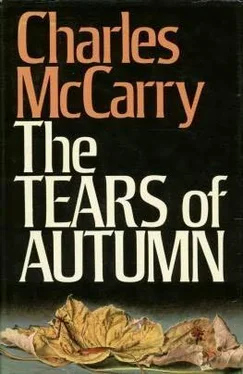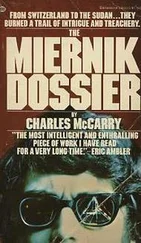“And what did they tell Oswald?”
“I don’t know yet. I would have told him that I was a Soviet intelligence officer, and that we’d been watching him benevolently for years, here and when he was in Russia, knowing that he was capable of a great act that would change history. That would have fitted in with his fantasy.”
Foley looked at his watch. “Half my time is gone,” he said wearily. “Why does it have to be a conspiracy? Why can’t Oswald have just done it for his own insane reasons?”
“One thing, and again it’s speculation, but it fits in with the theory because it fits in with standard clandestine practice,” Christopher said. “Oswald killed the President with a rifle. That’s the tool of an agent, not the weapon of a lunatic. Every other President who has been killed or wounded by an assassin has been killed or wounded by a pistol-Lincoln, Garfield, McKinley. Both Roosevelts were attacked with pistols. Gandhi was killed with a pistol. Nuts like to smell their victims. Oswald used a rifle, and he left it behind like a professional and walked away. If he’d been a real professional, instead of something designed for one-time use, he would have got away.”
Christopher was still standing. He had taken care to speak in a calm voice. He looked down at Foley, who had closed his eyes again; he was massaging the bridge of his nose to advertise his fatigue.
“I’d like to talk to you, Patchen,” Foley said.
He said nothing more to Christopher and did not look at him again.
Patchen walked Christopher to the door. Foley was still sprawled in the chair with his hand to his face when Patchen returned.
“Get me a glass of water,” he said.
When Patchen handed him the glass, Foley put it on the table beside him and opened his eyes; his pupils were still dark, as if bruised.
“How well do you know this Christopher?” Foley asked.
“We’ve known each other for twenty years,” Patchen said. “We came into the outfit on the same day. I’ve backstopped his operations for more than ten years.”
“Then you can’t be very objective.”
“You can check my assessment of Christopher with anyone else who knows his work,” Patchen said. “Three things: first, he’s intelligent and entirely unsentimental. Second, he will go to any lengths to get at the truth, he never gives up. Third, he is not subject to fear.”
“Everyone is subject to fear.”
“No. He’ll walk into anything.”
“Then he’s crazy,” Foley said.
“In that respect, maybe. But it makes him very valuable.”
“This theory of his is as full of holes as a Swiss cheese-you know that, don’t you?”
“I thought enough of it to bring you over here to listen to it,” Patchen said. “The theory, as a theory with no hard facts to support it, is sound enough.”
“Is it? In what way, exactly?”
“He’s right about two things. They had a motive, and they had the skill and the experience to bring off an operation of this kind.”
Foley leaped to his feet. Standing over Patchen, he pointed a finger at his face. “Let’s get this straight once and for all,” he said. “They had no goddamn motive. None.”
Patchen’s unblinking eyes did not change expression. “We both know they did, Dennis,” he said.
Foley’s face was closed and angry. Patchen knew why; he understood that Foley, who had defended the living President with all the power of his mind, did not regard loyalty as something that stopped with death. Foley had stood next to the President of the United States, believing that everyone ought to love him as Foley did. He wanted to believe that only a madman would kill such a man as Kennedy had been; he wanted the world to believe it.
“I won’t have any son of a bitch saying that what happened to Jack in Dallas was a punishment,” Foley said. He breathed deeply. “I want this matter dropped, right here and now,” he said. “Send Christopher back to wherever he comes from. Drop it, Patchen.”
“You don’t think this should be brought to the attention of the President?-two lines on a sheet of paper.”
“No. It’s not worth his time. If there is anything on paper, burn it. I don’t think you grasp the implications of what this nut is trying to get us to believe.”
“I see the implications,” Patchen said. “All of them. So does Christopher.”
“Who else is he going to go to with this?”
“No one.”
“You’re sure of that?”
“He lives in secret, Foley. He doesn’t talk to anyone but us.”
“You just told me he never gives up,” Foley said. “What if he decides not to give up on this, then what?”
“Then he’ll solve it, one way or another. He knows everybody in the world, and he’s a very senior officer. He requires no support. He’s what we call a singleton-he operates alone, goes where he pleases.”
“Then you’d better bring him back here and put him behind some nice, safe desk,” Foley said.
Patchen shook his head. “No. He’d resign. He doesn’t need us-he’s as well known as a journalist in the outside world as he is as an agent in ours.”
“What you’re telling me is that you have no control over him at all.”
“No, I’m not telling you that. Control is not necessary. He feels about the outfit the way you felt about John Kennedy. He’d do nothing to harm us, or the country. Of course, his idea of what’s harmful to the United States might not be the same as yours.”
Foley stared at Patchen, and then Patchen saw an idea being born behind Foley’s eyes.
“Has Christopher ever been like this before-hooked on something?” Foley asked.
“Lots of times. He’s usually been right.”
“He’s usually been right, or he’s usually come up with data that supported his theory?”
“It’s the same thing,” Patchen said.
“It’s not. When was the last time he saw a psychiatrist? Don’t you have regular psychiatric controls on guys like him?”
“Psychiatric controls? When a man breaks down, we take care of him, that’s all.”
Foley said, “I’ve seen this guy twice. Both times he’s been compulsive about something. It could be a pattern.”
Again Patchen said nothing. A pulse was beating in Foley’s temple; Patchen watched that.
“Christopher may have done great things in the past,” Foley said. “I don’t doubt it for a minute. But how long has he been out there-ten years, twelve? He’s showing it. He needs a rest, David. You must have a quiet place where he can recuperate.”
Patchen showed no surprise because he felt none. Foley, a much larger man, stood over him, giving off an odor of cologne and whiskey. Patchen understood how a woman about to be fondled by a man she does not want must feel. Foley, crude and emotional, seemed to him a ridiculous figure. Patchen’s lips parted in a smile.
“Why don’t you put that suggestion in writing,” he said, “and channel it to me through the Director?”
Foley departed, leaving his glass of water untasted. Ordering Patchen to fetch it for him had been a way of emphasizing the difference in their ranks. In Foley’s place, Patchen would have made the gesture at the end of the conversation, not at the beginning.
When Christopher came back into the house, Patchen played the tape recording of his conversation with Foley. Neither man said anything; the listening devices in Patchen’s living room were voice-activated transmitters that could not be switched off. They put on their coats and went outside.
“The bars must still be open,” Patchen said. “Let’s walk. “I’d like a beer.”
They were alone on the sidewalk, and when they reached Connecticut Avenue the broad street was empty of cars, though the automatic traffic signals went on working: the lights changed to red along its whole steep length, like cards falling out of a shuffler’s hand.
Читать дальше












